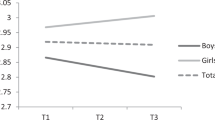Abstract
The present study sought to determine whether or not a personality variable, the level of moral development, was related to the way in which individuals respond to socially taboo words. As a result of their responses to a moral judgment questionnaire based on Kohlberg’s theory of moral development, 28 participants were assigned to one of two groups: (a) the conventional level group (Stages 3 and 4), a level that is desirous of maintaining social mores for their own sake, and (b) the postconventional level group (Stage 6), a mentality that emphasizes one’s own autonomy with regard to the adherence to social rules. Participants’ galvanic skin responses were assessed while they viewed 18 socially taboo and neutral words presented sequentially via a memory drum. As expected, participants’ GSRs to taboo words were significantly greater than their responses to neutral words, p <.05. Additionally, as hypothesized, the conventional level participants demonstrated significantly greater GSRs to socially taboo words than did the more morally autonomous postconventional participants. These findings support Kohlberg’s theory. Some practical applications of the present study are also discussed.
Similar content being viewed by others
References
ALSTON, W.P. 1971. Comments on Kohlberg’s ‘From is to ought’. In T. Mischel (Ed.), Cognitive development and epistemology. New York: Academic Press.
BRUNER, J.S., & POSTMAN, L. 1947. Emotional selectivity in perception and reaction. Journal of Personality, 16, 69–77.
DURKHEIM, E. 1953. Sociology and philosophy. Glencoe, Illinois: Free Press.
ERIKSEN, C.W. 1951. Perceptual defense as a function of unacceptable needs. Journal of Abnormal and Social Psychology, 46, 557–564.
FREUD, S. 1959. Collected papers (Vol. 1). New York: Basic Books.
GOLDIAMOND, I. 1958. Indicators of perception: I. Subliminal perception, subception, unconscious perception: An analysis in terms of psychophysical indicator methodology. Psychological Bulletin, 55, 373–411.
GRAY, S.G. 1977. Level of moral development as a related factor to emotional response intensity. Unpublished master’s thesis, East Texas State University.
HALL, R.T., & DAVIS, J.V. 1975. Moral education in theory and practice. Buffalo, N.Y.: Prometheus.
KOHLBERG, L. 1964. Development of moral character and moral ideology. In M.L. Hoffman & L.W. Hoffman (Eds.), Review of child development research. New York: Russell Sage Foundation.
KOHLBERG, L. 1969. Stages in the development of moral thought and action. New York: Holt, Rinehart, & Winston.
KUHN, D. 1976. Short-term longitudinal evidence for the sequentiality of Kohlberg’s early stages of moral judgment. Developmental Psychology, 12, 162–166.
KURTINES, W., & GRIEF, E.B. 1974. The development of moral thought: Review and evaluation of Kohlberg’s work. Psychological Bulletin, 81, 453–470.
McGINNIES, E. 1949. Emotionality and perceptual defense. Psychological Bulletin, 56, 244–251.
NOTHMAN, F.H. 1962. The influence of response conditions on recognition thresholds for taboo words. Journal of Abnormal and Social Psychology, 65, 154–161.
PIAGET, J. 1948. The moral judgment of the child. Glencoe, Illinois: Free Press.
POSTMAN, L., BRUNER, J.S., & McGINNIES, E. 1948. Personal values as selective factors in perception. Journal of Abnormal and Social Psychology, 43, 142–154.
TURIEL, E. 1973. Stage transition in moral development. In R. Travers (Ed.), Second handbook of research on teaching. Chicago: Rand McNally.
Author information
Authors and Affiliations
Rights and permissions
About this article
Cite this article
Gray, S.G., Hughes, H.H. & Schneider, L.J. Physiological Responsivity to a Socially Stressful Situation: The Effect of Level of Moral Development. Psychol Rec 32, 29–34 (1982). https://doi.org/10.1007/BF03399520
Published:
Issue Date:
DOI: https://doi.org/10.1007/BF03399520




